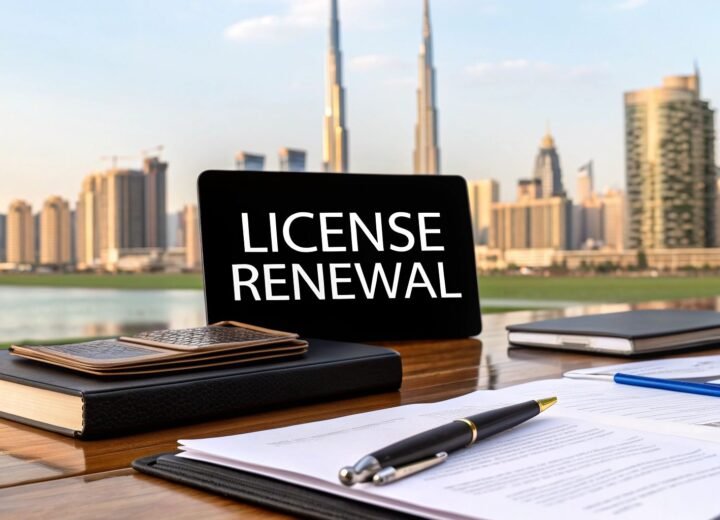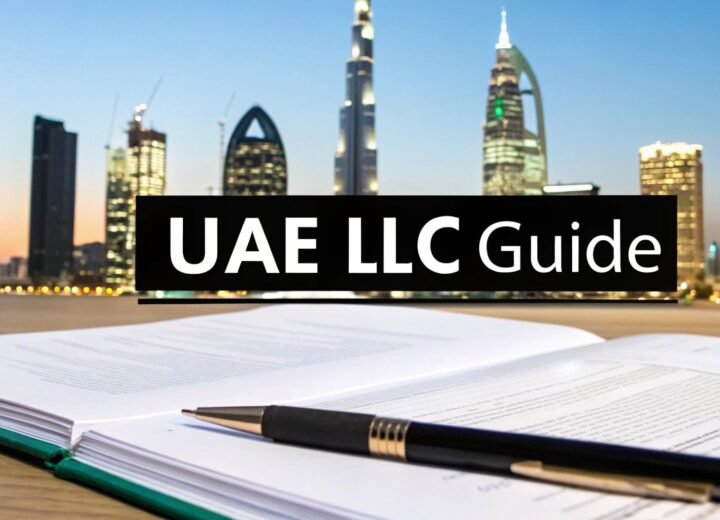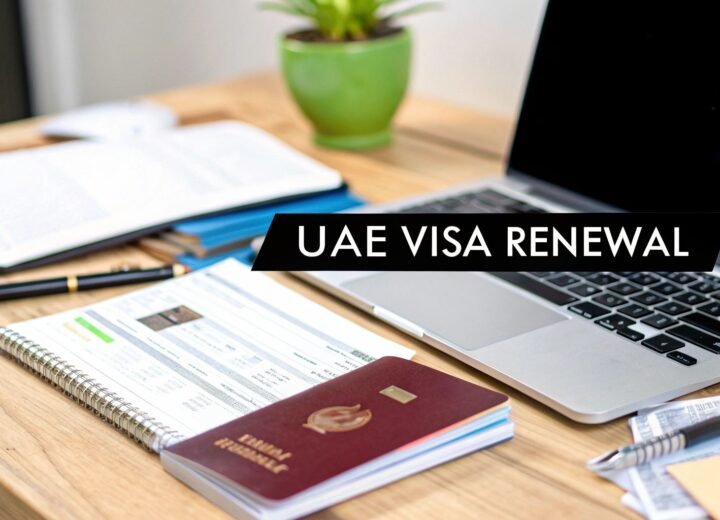Securing a UAE residence visa is your ticket to living and working in one of the world's most exciting places. It’s a multi-step journey, but it doesn't have to be complicated. The process really boils down to three main phases: getting an entry permit from your sponsor, passing a medical fitness test once you're in the country, and finally, having the visa stamped into your passport.
This guide will walk you through it all, giving you a clear roadmap for your new life in the Emirates.
Understanding Your Path to UAE Residency
First things first, let's be clear on what a UAE residence visa really is. It's much more than just a sticker in your passport; it’s your official permit to live, work, or invest here long-term. Think of it as the master key that unlocks everything else—opening a bank account, signing a tenancy contract for your apartment, and getting your kids into school.
The UAE government has rolled out a really diverse and flexible visa system designed to attract global talent and investment. This means there isn't just one way to get residency. The best route for you depends entirely on your personal situation and professional goals.
The Main Visa Categories
Your reason for moving to the UAE directly shapes your visa options. The main pathways are designed for a wide range of people, from corporate professionals and entrepreneurs to families wanting to join their loved ones.
The most popular routes include:
- Employment Visa: This is the most common one, sponsored by a company either on the mainland or within a free zone.
- Investor Visa: For those putting their money into UAE property or a local business.
- Family Visa: Allows residents to sponsor their spouse, children, and sometimes other dependents.
- Specialised Visas: These include prestigious options like the Golden Visa for exceptional talents, investors, and professionals.
The property investor visa is a very popular choice. If you own a property valued at a minimum of AED 750,000, you can get a renewable two-year residence visa. For retirees, owning a property worth at least AED 1 million can secure them a five-year visa. There are also newer, more flexible options like the Green and Golden visas aimed at skilled professionals and entrepreneurs, with costs that change based on the type and duration.
To get a clearer picture of where you might fit, it helps to see the main options side-by-side.
Common UAE Residence Visa Pathways at a Glance
Here’s a quick summary of the most popular UAE residence visa options, their typical validity, and the main requirement for each to help you find your best fit.
| Visa Type | Typical Validity | Primary Requirement |
|---|---|---|
| Employment Visa | 1-2 Years | A valid employment contract from a UAE-based company. |
| Investor Visa (Property) | 2-5 Years | Owning a property valued at AED 750,000 or more. |
| Investor Visa (Business) | 5 Years | Investing in or establishing a business in the UAE. |
| Family Visa | 1-2 Years | Sponsorship by a resident family member (spouse or parent). |
| Golden Visa | 10 Years | Meeting specific criteria for talent, investment, or entrepreneurship. |
| Green Visa | 5 Years | For skilled employees, freelancers, or investors without a sponsor. |
This table gives you a starting point. As you can see, the path you take will depend on whether you're coming for a job, investing, or joining family.
Securing a UAE residence visa is more than a legal formality; it's the foundational step to building your future in the Emirates. By understanding the core pathways—be it through employment, property investment, or family sponsorship—you can strategically plan your move and avoid common pitfalls.
This guide is designed to be your strategic overview. We'll now dive into each of these routes, breaking down exactly what's required and how the process works. Whether you're planning to set up a business in a Dubai free zone, buy an apartment in Abu Dhabi, or join a company in Sharjah, the following sections have you covered.
Finding Your Ideal UAE Visa Pathway
Choosing the right visa is the most critical first step in your journey to becoming a UAE resident. This decision will shape not only your application process but also your long-term lifestyle and professional opportunities in the country.
To make the best choice, you need to look beyond basic definitions and think about which real-world scenario best fits your personal and career goals.
Employment-Based Residency
For most people, the most direct route to a UAE residence visa is through a job. In this case, your employer sponsors you and handles the bulk of the paperwork. But where your company is registered makes a big difference.
- Mainland Company Sponsorship: If you get a job with a company licenced by the Department of Economic Development (DED) in Dubai, Abu Dhabi, or Sharjah, you'll be on a mainland visa. This generally gives you more freedom to work with clients anywhere in the UAE.
- Free Zone Company Sponsorship: Many international businesses set up in one of the UAE’s numerous free zones, like DMCC or JAFZA. While a free zone visa might technically limit your direct business activities to that zone, it’s a very popular option thanks to benefits like 100% foreign ownership.
Understanding this distinction is key. A sales professional wanting to serve the entire local market would be better off with a mainland visa. On the other hand, a tech startup operating globally might find a free zone setup more practical and cost-effective. We are specialists in both Mainland Company Formation in Dubai, Sharjah & Abu Dhabi and Freezone Company Formation across the UAE.
Investment and Entrepreneurship Routes
If you're an investor, entrepreneur, or a highly skilled professional, the UAE has several powerful visa options that give you more independence and long-term security. These routes are specifically designed to attract capital and talent.
The two main paths for investors are the Property Investor Visa and the well-known Golden Visa. The Property Investor Visa is a solid choice if your main goal is getting residency through real estate. We are specialists in Golden Visa on Property and Investor Visa applications, helping clients navigate the requirements for a smooth approval process.
Another prominent option is the UAE Golden Visa, which offers significant long-term benefits. Its popularity has exploded in recent years. For more specifics, a detailed UAE Golden Visa guide can provide a lot of clarity.
The UAE's Golden Visa programme has become a cornerstone of its residency strategy. In 2021, around 47,150 Golden Visas were issued. By 2023, that number had surged to approximately 158,000—more than tripling in just two years.
Specialised and Family Visas
Beyond work and investment, the UAE has visas for many other situations. The Family Visa, for instance, allows residents who meet a minimum salary requirement to sponsor their spouse, children, and sometimes even their parents. This is essential for anyone looking to relocate with their loved ones.
The Green Visa has also been a game-changer, especially for skilled freelancers and self-employed individuals. It provides a five-year residency without needing a sponsor, offering incredible flexibility for independent professionals. This is perfect for consultants, creatives, and tech experts who work on a project-by-project basis.
Comparing Key UAE Residence Visa Options
To help you see the differences more clearly, here is a breakdown of the main visa options for investors and skilled professionals.
| Feature | Investor Visa (Property) | Golden Visa | Green Visa |
|---|---|---|---|
| Primary Requirement | Own property worth at least AED 750,000. | Significant investment (e.g., AED 2M in real estate), or exceptional talent. | Be a skilled employee, freelancer, or investor meeting specific criteria. |
| Sponsor Needed | No (sponsored by property). | No. | No. |
| Validity Period | 2 years (renewable). | 10 years (renewable). | 5 years (renewable). |
| Family Sponsorship | Can sponsor immediate family. | Can sponsor immediate family without age restrictions. | Can sponsor immediate family. |
| Stay Outside UAE | Less than 6 months at a time. | No restriction. | No restriction. |
This table highlights the fundamental differences in cost, validity, and freedom of movement. By carefully weighing these pathways against your own situation—whether you're a salaried employee, a property buyer, or a freelancer—you can confidently pick the route that makes the most sense for you.
Navigating the Core Application Process
Once you've settled on the right visa pathway for you, it’s time to get down to the application itself. This is where things get real, moving from planning into a series of concrete steps that end with you becoming a UAE resident.
The whole journey is quite systematic. Each stage builds on the one before it, so getting the sequence right is key to a hassle-free experience.
Securing Your Entry Permit
Before you can even think about the formalities inside the country, you'll need an entry permit. You might hear this called a pink visa. Essentially, it’s your legal ticket to enter the UAE specifically to finalise your residence visa. It's usually valid for 60 days, which gives you a clear window to get everything else done.
Who applies for this permit depends entirely on your situation. If it's an employment visa, your new company—whether they're a mainland business in Dubai or a free zone entity—will handle the application for you. If you’re getting an investor visa through a property purchase, the developer or a registered agent often kicks off this process.
This is the first practical step: submitting the application through the correct government portal.
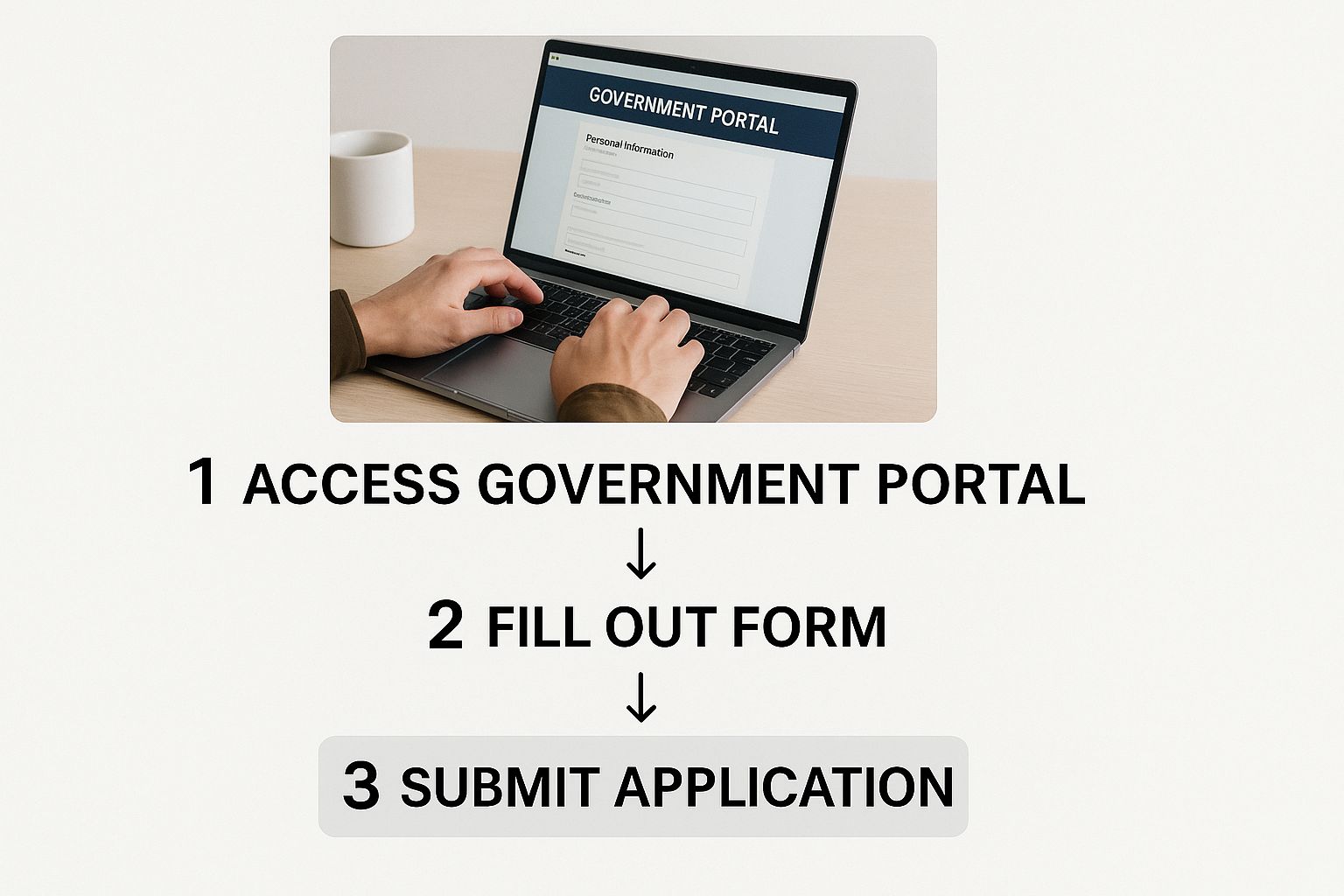
This initial submission triggers a series of checks by the authorities to verify your sponsor's eligibility and make sure your application ticks all the preliminary boxes.
The In-Country Formalities: Medical and Biometrics
After you've arrived in the UAE with your new entry permit, the clock starts ticking. The next phase involves a couple of critical, mandatory procedures: the medical fitness test and the Emirates ID application, which includes giving your biometric data.
The medical fitness test is a standard health screening for all residence visa applicants over 18. It’s done at government-approved health centres and typically screens for certain communicable diseases.
Insider Tip: Standard medical test results can take a day or two, but most centres offer VIP or express services. For an extra fee, you can often get your results in just a few hours, which can seriously speed up your overall timeline.
At the same time, you'll need to start your application for an Emirates ID. This means a visit to an Emirates Identity Authority (EIDA) service centre to have your fingerprints scanned and a photograph taken. This ID is a vital document and will become your primary form of identification across the UAE.
Feeling swamped by the paperwork? Let our experts take the load off. We are specialists in Corporate PRO Services and Attestation Services, and we’re here when you need us with 24/7 support to make your visa process seamless. 📞 Call Us Now: +971-54-4710034 or 💬 WhatsApp Us Today for a Free Consultation.
From Application to Final Stamping
Once your medical results are in and your Emirates ID biometrics are done, your sponsor can push forward with the final submission for the visa stamping. This is the last and most important step.
The General Directorate of Residency and Foreigners Affairs (GDRFA) will review all your documents. Upon approval, they will place the official residence visa sticker into your passport.
The timeline for this entire in-country process can vary, but you can generally expect it to take between 7 to 15 working days from the day you complete your medical test. For those on a tighter schedule, like applicants for a Golden Visa, the process can sometimes be fast-tracked. If you're curious about this prestigious long-term residency, our comprehensive guide on how to apply for a Golden Visa in the UAE has all the details.
The moment that visa is stamped, you are officially a resident of the United Arab Emirates. It's the final step that solidifies your journey from applicant to resident, unlocking your ability to live and work in the country.
Assembling Your Document Checklist
If there's one piece of advice I can give, it's this: a smooth UAE residence visa application comes down to having your paperwork perfectly in order from the get-go. I’ve seen it time and time again—a single missing document or an incorrect format can cause frustrating delays or even outright rejections. Getting this stage right is the most critical part of the process you can control.
While the exact list can change depending on whether you're coming for work, investment, or to join your family, there’s a core set of documents everyone needs.
The Universal Requirements for All Applicants
No matter what visa you're applying for, you'll need to get these foundational documents ready first. Think of them as the non-negotiables that will start your file with the immigration authorities.
Every applicant will need:
- A High-Quality Passport Copy: This needs to be a clear, coloured copy of your passport’s main information page. Critically, your passport must have at least six months of validity left on it and a minimum of two blank pages for the visa stamp.
- Passport-Sized Photographs: The UAE has very specific guidelines here. The photos must be recent, taken against a pure white background, and meet the required dimensions (usually 4.3 cm x 5.5 cm). Don't try to use old photos; it's a common reason for applications to be sent back.
- Entry Permit: Often called the "pink visa," this is the initial permit that allows you to enter the UAE to finalise your residency. Your sponsor is responsible for arranging this and will give you a copy.
Nailing these basics prevents simple, yet common, setbacks right from the start.
Visa-Specific Documentation You Cannot Forget
Once you have the essentials, the next layer of paperwork depends entirely on your reason for moving to the UAE.
For an Employment Visa, for instance, you'll need your signed offer letter and the official labour contract from the Ministry of Human Resources and Emiratisation (MoHRE). For many professional jobs, an attested educational degree is also mandatory. This isn't just a copy of your diploma; it has to be officially verified.
In contrast, if you're applying for an Investor Visa on Property, the star document is your title deed from the Land Department, proving you own a property that meets the minimum value. For a Family Visa, you’ll need an attested marriage certificate to sponsor a spouse and attested birth certificates for your children.
Preparing your document checklist isn't just ticking boxes; it's a strategic move. A complete and properly attested file proves your eligibility and dramatically speeds up processing times. It's the single biggest factor you can influence for a faster outcome.
The Critical Role of Document Attestation
One of the biggest hurdles for new applicants is understanding document attestation. This is the official process of verifying that documents issued outside the UAE are genuine, making them legally recognised here.
Any official certificate you're using—like a university degree, marriage certificate, or birth certificate—has to go through a multi-step verification journey. It usually looks like this:
- Verification by the Ministry of Foreign Affairs (or an equivalent body) in your home country.
- A stamp from the UAE Embassy or Consulate in your home country.
- A final attestation from the Ministry of Foreign Affairs (MoFA) here in the UAE.
This chain of verification can take a while, so it’s something you should start on as early as possible. As specialists in Corporate PRO Services and Attestation Services, our team handles this entire process for clients, making sure every stamp is in the right place so you don’t have to deal with the international back-and-forth.
Some visa types might also require a Police Clearance Certificate to show you have a clean criminal record. For a full breakdown, our guide explains how to get a Police Clearance Certificate in the UAE. Having this ready in advance can save you from a last-minute scramble and keep your application moving forward.
Maintaining Your Visa and Avoiding Common Pitfalls
Getting your UAE residence visa stamped in your passport is a fantastic feeling, but it's not the end of the road. Now, the focus shifts to maintaining your status, which means getting familiar with a few key rules. Staying on the right side of these regulations is crucial for a smooth, long-term stay and helps you sidestep common slip-ups that can lead to fines or, in the worst cases, visa cancellation.
Even the most buttoned-up applicants can run into snags. A very common issue we see is documents getting rejected because of incorrect or missing attestation. Another classic delay happens with the medical test results; if a finding is inconclusive, you might have to re-test, which can easily push your timeline back by a week or more. Just knowing these things can happen is half the battle.
Our Corporate PRO Services team has pretty much seen it all. We help clients through these hiccups every single day, making sure every document is perfectly attested and showing them how to fast-track certain steps where possible. With our 24/7 Support Service, you're never left wondering what to do next because we're always here when you need us.
Understanding Key Residency Rules
Once that visa is active, it’s on you to stay compliant. For most people on a standard residence visa, the most critical regulation to know is the "six-month rule." Simply put, if you stay outside the UAE for more than 180 consecutive days, your residence visa automatically becomes void.
This is a hard and fast rule, and it catches a surprising number of residents off guard. It’s absolutely essential to plan your travel around this to ensure you fly back into the country before that 180-day clock runs out.
That said, some visa categories do offer a lot more breathing room:
- Golden Visa Holders: Are completely exempt from this rule and can remain outside the UAE for as long as they need without their residency being affected.
- Green Visa Holders: Also benefit from more relaxed terms regarding their time spent abroad.
Knowing the specific conditions attached to your visa type is non-negotiable for any kind of long-term planning.
The Importance of Timely Visa Renewal
Your UAE residence visa isn't forever—it comes with an expiry date. The renewal process is just as vital as your first application. Typically, the government gives you a 30-day grace period after your visa expires to get the renewal sorted.
If you miss this window, you’ll start racking up daily overstay fines. It's a costly headache that's very easy to avoid. The renewal process mirrors your initial application, meaning you'll need a new medical fitness test and an updated Emirates ID application.
Staying compliant isn’t about navigating a bureaucratic maze; it’s about proactive planning. Understanding the six-month rule and renewal deadlines is what protects your residency status and keeps your life in the UAE running smoothly.
The UAE authorities are very serious about residency compliance. To give you an idea, in the first half of 2025 alone, officials apprehended over 32,000 individuals for violating visa regulations, with a large number facing deportation. This highlights the government's firm commitment to keeping the system secure and lawful for everyone. You can read more about the UAE's stance on residency compliance and their recent initiatives.
Navigating Visa Cancellation
If your situation changes—maybe you're switching jobs or planning to leave the UAE for good—you must officially cancel your current visa. This has to be done before a new visa can be issued or before you depart the country permanently. Just letting a visa expire is not the right way to go and can lead to major complications down the line, including fines or even a ban on re-entry.
The cancellation is handled by your sponsor, who submits a formal request to the immigration authorities. This step ensures your official record is clear, allowing you to either transfer to a new employer's sponsorship or exit the country without any legal loose ends. It's a critical final step, whether you're taking a new job in Dubai or starting a new adventure somewhere else. Our team can manage this process for you efficiently, for both mainland and free zone companies.
Life After Your Visa What to Do Next
Congratulations, the final stamp is in your passport, and you are officially a resident of the UAE! This is a huge milestone, but really, it’s just the beginning of your new chapter. Now, the focus shifts from paperwork and processes to actually setting up your life and settling into your new home.
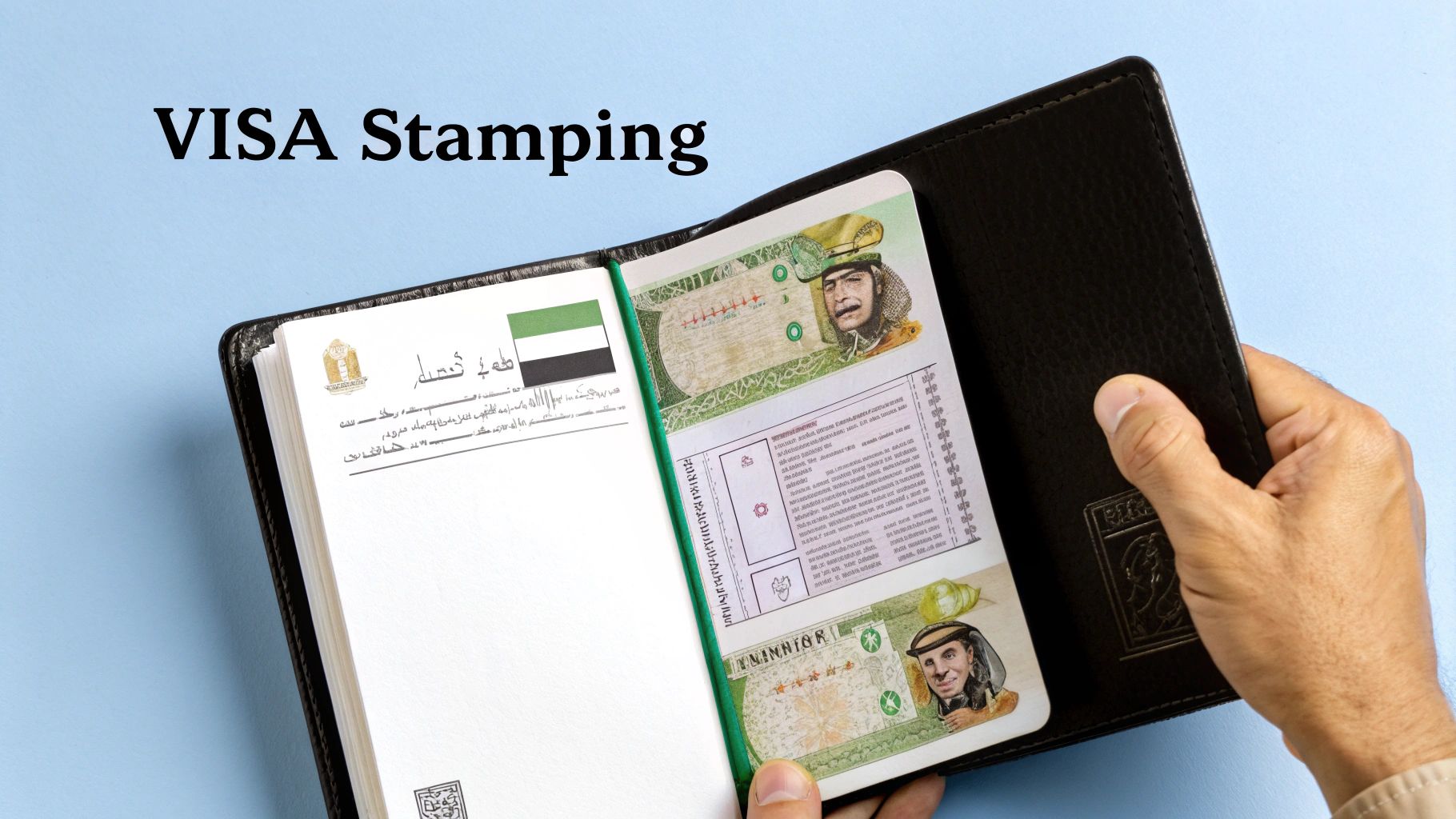
This final phase is all about turning your residency into a real lifestyle. There are a few immediate, practical steps you'll need to take to make your transition seamless and start enjoying everything the Emirates has to offer.
Your Immediate Settling-In Checklist
With your visa and Emirates ID in hand, you can now unlock all the essential services. These are the first things you should tackle to get your day-to-day life up and running smoothly.
Your top priorities should be:
- Opening a Local Bank Account: Your Emirates ID is the golden ticket here. This is fundamental for receiving your salary, paying bills, and managing your finances in the country.
- Securing a Rental Contract (Ejari): To rent an apartment or villa in Dubai, your tenancy agreement must be registered with the Ejari system. Your residence visa is a non-negotiable prerequisite for this.
- Setting Up Utilities: Once you have your Ejari, you can get your electricity and water connected with the local authority, like DEWA in Dubai.
- Getting a UAE Driving Licence: Depending on your nationality, you might be able to simply convert your home country’s licence. For others, it might mean taking lessons and passing a test.
Ticking these items off your list will build the foundation for your new life, transforming you from a visitor into a fully integrated resident.
The moment your visa is stamped is not the finish line; it’s the starting line for building your new life. Prioritising these initial steps—banking, housing, and transport—ensures your transition into UAE society is both swift and successful.
Unlocking the Benefits of UAE Residency
Beyond the immediate setup, your residence visa opens the door to a host of incredible advantages that make the UAE such a global hub for entrepreneurs and professionals. It’s more than just a place to live; it's a platform for growth.
One of the most significant advantages is the favourable tax environment. As an international entrepreneur, you can enjoy UAE tax benefits, allowing you to retain more of your earnings and reinvest in your business. This is a core reason why so many choose to set up a mainland or free zone company here.
After successfully getting your UAE residence visa, understanding how to manage your finances in an international context is vital. This includes navigating multiple currencies and tax laws, which you can learn more about in this comprehensive guide to financial planning for expats.
Furthermore, residency grants you and your sponsored family members access to world-class healthcare facilities and a wide array of international schools, ensuring a high quality of life. Whether you've secured a Golden Visa on property or an investor visa through a new company, these benefits are now at your fingertips. From our Cost-Effective Business Setup Solutions tailored to your needs to our 24/7 support, our team is here to ensure you make the most of every opportunity.
Your Top UAE Visa Questions Answered
When you're navigating the path to UAE residency, a lot of questions can pop up. Let's tackle some of the most common ones we hear from our clients every day.
Can I Start My Visa Application From Outside the UAE?
Yes, you absolutely can. The initial step, which is getting an entry permit, must be started by your sponsor while you're still abroad. This sponsor could be your new employer, a real estate developer if you've bought property, or another eligible entity.
However, you can't complete the process from your home country. You have to physically enter the UAE using that entry permit. Once you're here, you'll need to complete the mandatory, in-country procedures like the medical fitness test and the biometrics appointment for your Emirates ID.
How Long Does the Whole Visa Process Take?
This is a big one, and the timeline really depends on the type of visa you're after and how quickly you get through each stage.
Generally, once you’ve landed in the UAE, you can expect the process—from the medical test to getting that final visa stamp in your passport—to take anywhere from 7 to 15 working days. If you're in a hurry, many service centres offer 'VIP' options that can speed things up considerably.
A critical rule to remember: for most standard residence visas, if you stay outside the UAE for more than 180 consecutive days, your visa will be automatically cancelled. This is vital for maintaining your residency status.
It's worth noting that certain categories, like the Golden Visa, come with more flexibility. Golden Visa holders can stay abroad for much longer periods without it impacting their residency, which is a major perk for global professionals and investors.
Feeling overwhelmed by the paperwork for a mainland or free zone company, an investor visa, or corporate PRO services? Let us handle the complexities. We offer expert, Cost-Effective Business Setup Solutions with 24/7 Support Service to make your journey smooth and stress-free. 📞 Call Us Now: +971-54-4710034 or 💬 WhatsApp Us Today for a Free Consultation at https://prodesk.ae.

